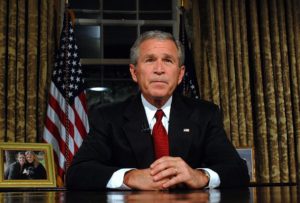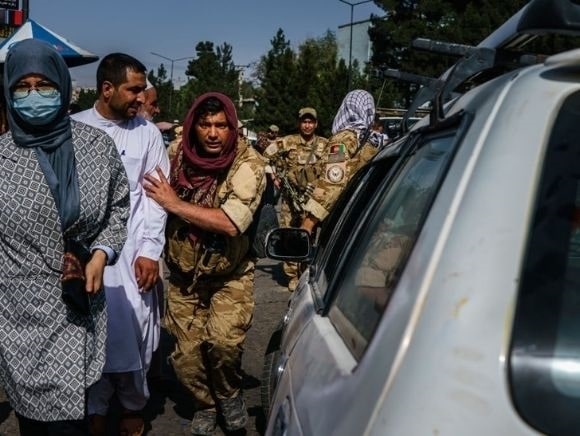When George W. Bush proclaimed loudly during the 2000 presidential campaign that his prospective administration would refuse to engage in what he termed “nation-building,” it set forth a fundamental recalibration of how American power would be projected upon the world. Instead, that proclamation would result in one of the most ironic — and many would say catastrophic — reversals of foreign policy in American history. And in the end, it was for George W. Bush what “read my lips, no new taxes” became for his father, the 41st president: his downfall.

George W. Bush
(Photo by Roger L. Wollenberg-Pool/Getty Images)
At the time candidate Bush shunned the building of democracies, of course, we were still bathing in the warm afterglow of victory in the defining twilight struggle of the age. Soviet communism had collapsed. Democracy had prevailed. We had reached “the end of history,” as Francis Fukuyama famously called it.
Then came 9/11/01, and everything changed, including the mind of President Bush. He not only discarded his pledge on nation-building but also touted his 180-degree about-face as the signature policy of his administration. In his second inaugural address in 2005, Bush laid it down, even as Iraq was coming apart: “The survival of liberty in our land increasingly depends on the success of liberty in other lands. The best hope for peace in our world is the expansion of freedom in all the world.”
Thus, Bush pledged the good offices of America as the super-spreader of democracy in Iraq, Afghanistan, and other nations of strategic importance to the United States — by whatever means necessary. He had decided that only democratic governments, whether produced organically or installed by force, could provide the necessary stability in the explosive oil-rich Middle East and prevent future acts of terrorism against the United States. Since Americans demand liberty, the thinking went, surely the people of foreign lands would want the same.
Bush was certain, with good reason, that his worldview, which came to be known as neoconservatism, would define his legacy.
Well, he was right on that score. But, of course, hardly in the way he envisioned. By the time his second term was ending, with Iraq in a quagmire and our involvement in Afghanistan showing no end in sight, Bush had fallen to an almost unthinkable 25% approval. For comparison, Trump’s all-time low was almost ten points higher — 34% — after Charlottesville and again following the ugliness of Jan. 6. That is how discredited the Bush and Dick Cheney-inspired foreign adventurism had become.
Undeterred, Republicans went on to nominate classic war hawks, neoconservatives to the core, in the next two presidential elections. John McCain and Mitt Romney were both beaten badly. It was not until the emergence of Trump, and his pledge to end the seemingly endless foreign entanglements, that the Republican Party was returned to foreign policy favor in the eyes of voters.
Trump heard the call and negotiated with the Taliban on a careful withdrawal from Afghanistan that would leave American respect intact. He would do the obvious and evacuate our human assets prior to the inevitable onslaught of the same back-to-the-future, terrorist-supporting regime thought to be lying on the ash heap of history two decades ago. Does anyone doubt the Taliban feared the wrath of Trump if it violated an agreement with him?
Inexplicably, Biden and Secretary of State Antony Blinken — along with the wizened defense and foreign policy establishment, challenged mightily by Trump but reconstituted by Biden — could not, or would not, bow to naked reality on the ground.
 At least in Iraq, we can take some heart that Saddam Hussein was vanquished, and an enslaved people were provided at least a ray of hope. But the aftermath of that takedown created a fresh cauldron of extremism marked by the rise of the post-Saddam terrorist organization ISIS, and the years spent by Presidents Barack Obama and Trump dismantling its caliphate. The new political landscape proved more destabilizing than even Saddam’s reign of terror over an always-unstable composite country devoid of heritage, pieced together out of whole cloth 100 years ago following World War I.
At least in Iraq, we can take some heart that Saddam Hussein was vanquished, and an enslaved people were provided at least a ray of hope. But the aftermath of that takedown created a fresh cauldron of extremism marked by the rise of the post-Saddam terrorist organization ISIS, and the years spent by Presidents Barack Obama and Trump dismantling its caliphate. The new political landscape proved more destabilizing than even Saddam’s reign of terror over an always-unstable composite country devoid of heritage, pieced together out of whole cloth 100 years ago following World War I.
In Afghanistan, the outcome is easier to describe, and arguably even worse than in Iraq: 20 years of blood and treasure in exchange for less than nothing. Seven thousand Americans died in the twin wars. Tens of thousands more were wounded. Untold masses of innocent Iraqis and Afghans died in the crossfire. And all we have to show for it are thousands of new enemies bent on revenge and a mammoth, 9/11-prompted Homeland Security Administration that both protects and threatens individual liberty.
The question now is whether the same region, the same countries, that destroyed the legacy of one president might ironically do the same to the commander in chief of another party more than a decade later. Indeed, with the catastrophic images emanating from Afghanistan, will this unconquerable country — aptly termed the “graveyard of empires” — become the same for the presidency of Joseph Robinette Biden Jr.?
~
Read more from Tim Donner.




